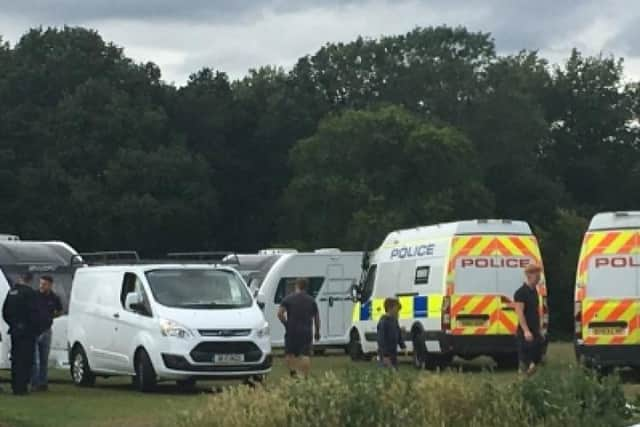New laws mean Travellers could face prison or fines for illegal encampments in Milton Keynes
and live on Freeview channel 276
The proposed new laws have been applauded by local Deputy Police and Crime Commissioner Matthew Barber who has been lobbying Parliament for months to get tougher.
He said the legislation will make it a criminal offence to intentionally set up a camp and trespass on private land.
Advertisement
Advertisement
"It is understood that the legislation will give police power to fine those who intentionally break the law up to £2,500 and include the possibility of a three-month prison sentence," he added.


Mr Barber, who is the Conservative candidate for PCC election in the May elections said landowners currently face legal battles and court costs to evict Travellers from their sites because trespass remains a civil offence.
He said: "I have lobbied the Home Office on the issue of illegal encampments for many months. It is a real concern... I have spoken to the Home Secretary and the Policing Minister at length and I look forward to seeing the details of the proposal when they are presented to Parliament.
"The new Criminal Justice Bill will authorise the police to take enforcement action against two illegally parked vehicles. The current number is six. The police would also be able to take action to prevent any damage, disruption or distress to landowners.
Advertisement
Advertisement
“This will be similar to legislation introduced in Republic of Ireland in 2002 and will fulfil one of the Conservatives' manifesto commitments. I am fully behind the government's strong action.” he added.
It is also expected that the law will allow police enforcement against anyone over 18 who fails to vacate a private property when asked to do so by the landowner or police. Those found to be illegally occupying the property will also be barred from returning for at least twelve months.
Despite the pandemic there were over 750 illegal encampments reported last year in Thames Valley alone.
Mr Barber said: "Law-abiding residents and businesses in Bucks, Berks and Oxon have the right to peaceful enjoyment and protection of their property. This is absolutely the right thing for the government to do.
Advertisement
Advertisement
"If elected as Thames Valley's next Police and Crime Commissioner, I will fully support our police force and local authorities to clampdown on illegal encampments. I will also do everything possible to work closely with local authorities transit sites and monitor the permanent pitches. I make no apology that under my leadership, I will never turn a blind eye to illegal trespass on private property.”
Meanwhile, during the Covid crisis, Travellers have complained of being "forgotten" by yher auithorities.
When the crisis struck last year, there were 33 Traveller vans pitched legally on sites operated by MK Council. Several more have parked illegally throughout the city during lockdown, and these were moved on as normal.
A spokesman for The Travellers’ Times, a national project seeking to challenge discrimination, said last summer: “Many families are worried about how they can protect themselves and others and follow the public health guidance. It’s unacceptable that they are excluded from some local authorities’ planning and delivery of support for vulnerable groups.”
Advertisement
Advertisement
A report from human rights group Doctors of the World found UK Travellers, like all “excluded people”, are at greater risk of being exposed to the coronavirus and are struggling to access healthcare services
The Traveller Movement charity said it is was to estimate the impact of the coronavirus on Gypsy, Roma and Traveller communities, but that existing health disparities will be exacerbated.
Chelsea McDonagh, the group’s education policy and campaigns officer, said GRT communities like hers have been forgotten about.
She said: “Those who are still roadside are not protected by the weak government guidance and as a result are still being moved on, whilst access to education is not happening for all GRT children."